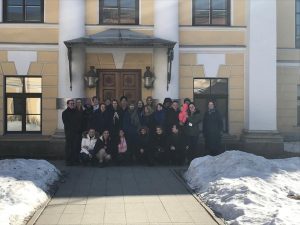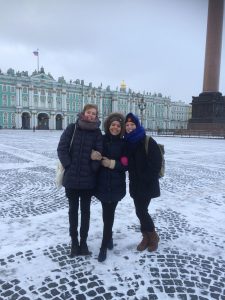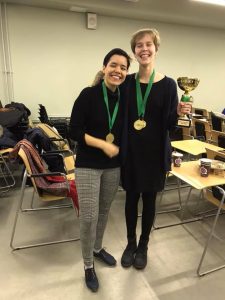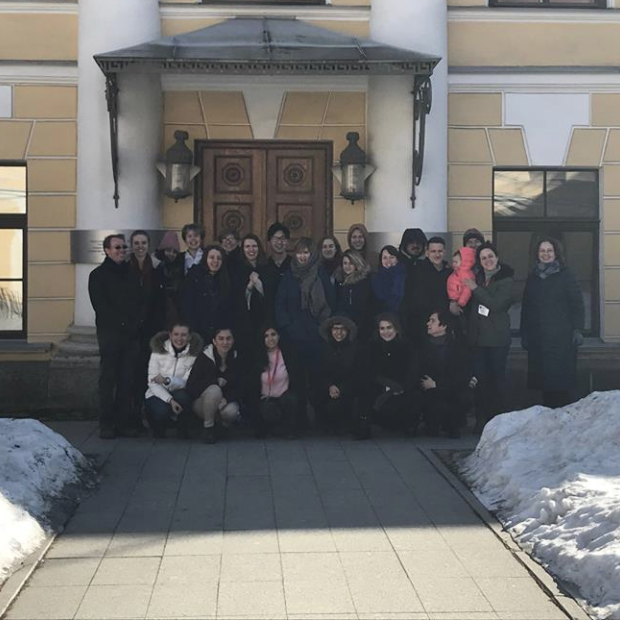
In the madness of midterm essay-writing at the end of March, we — Elena Müller (BA 2021), Hanna Bargheer (BA 2020) and Rebecca Singer (BA 2021) — attended the Bard Network Debate Conference and participated in the Smolny Open Debate Tournament in St. Petersburg, Russia. Sponsored by Bard Annandale’s Debate Union, each of the participating teams was treated to a lovely hotel room with views of the frozen Neva river. We tasted traditional Russian and Georgian meals and visited St. Petersburg’s many wonderful sites, including the Hermitage.
The event was organized and run through the cooperation of Bard Annandale’s Debate Union and Smolny College’s own debate union and was hosted at Smolny University in the heart of St. Petersburg. Many thanks to Anna Lastochkina, Vladimir Orlov, Ruth Zisman and David Register for making this possible. Everyone at the conference participated with the aim of strengthening the ties within the debating community and the network between Bard Annandale, Al-Quds Bard, American University in Central Asia, European Humanities University, Bard College Berlin, and Smolny College.

The first half of the event was the conference lead by Ruth Zisman, co-founder of the Bard Debating Union, who gave talks about the management of debating unions and how each of the schools can best go about creating a stable, functional and productive union of their own. David Register, the other co-founder of the Bard Debating Union and the founder of the Bard Prison Initiative, gave workshops on strategies for competitive debating and judging practices as well as good sportsmanship. He elaborated on the importance of networking and being an active member in the debating community and mentioned in his talks how important the judging aspect of debates is for winning tournaments, which is often forgotten. He highlighted that it is not the prettiest speeches that win debates, but the most logically structured and analytical ones. This was a relief for many participants in the conference who were non-native English speakers and who admitted sometimes feeling discouraged in English debates where native speakers are ordinarily more eloquent. In the spirit of the international setting, each team came away with the commitment to better the technique and deepen the bonds of their own union as well as their bonds with the other schools’ unions.
After conferences and workshops were held on Thursday and Friday (14th and 15th of March), the weekend was devoted to the tournament. The tournament was facilitated by the student members of the Smolny debating union and their coaches, Anna and Vladimir. It was inspirational to see their professionalism in hosting such a large event!
Sixteen teams from all over the world participated in five rounds leading up to the final, sixth, round on Sunday. The tournament involved several top judges from places such as Tel Aviv and Belgrade. It was a distinct pleasure for part of our team to get the chance to work along such well respected and experienced judges; it was interesting to hear teams from around the world debating such motions as “This house would limit presidents to two terms,” especially in light of current events in Chinese politics and the controversies surrounding the Russian elections that took place at the same time as the tournament.
The final motion of the tournament read: “This House would support the implementation of a Social Credit System in Western Liberal Democracies”. The information sheet that was given to every team fifteen minutes before the debate was set to begin explained the Social Credit System: It is a system in which people earn points (through voting, charity, social services, the choice of socially beneficial jobs etc.) that they use to access education, health care and housing; the larger the number of points accumulated, the better the quality of the facilities to which one has access.
Hanna and Elena, who represented BCB in the tournament, were the team in the Opening Government (OG) position, meaning they were the first to speak and had to debate in favour of the system. To give the reader a better idea of what actually happens in a debate, we want to explain to you our argumentation: We won the debate by explaining that the comparison is not that large between a “no-rating system” and the theoretical Social Credit System. In a “no-rating” capitalistic system, as it exists in Western Liberal Democracies, people are constantly rated on the work they do; instead of being rewarded with “points”, they are rewarded with money. This system is incredibly unjust because the opportunities for monetary compensation are inequitably distributed within the typical Western Liberal Democracy. This inequality of initial resource endowments results in differential access to education, health care and housing. A Social Credit System mitigates the evils of capitalism as it gives more people the opportunity to receive access to these institutions, which are undeniably important for personal development and empowerment. Only the willingness to act for the good of the society is needed to secure social resources. So, the chances of Western Liberal Democracies to develop into more just and empowered societies is more likely with a Social Credit System. (Please note that this is not the personal opinion of any of us, but it is the position we took in the debate to win).

To ensure that others will have the chance to partake in such impactful events, the BCB Politics, Rhetoric and Debate Society is committed to remaining engaged in our community as well as to actively seeking out new members and new opportunities. Thanks to the ideas and the connections formed at the conference, we will now begin circulating a semester newsletter. This will be distributed to the other members of the network as well as to our own debating and college community to create a better understanding of who we are and what we do: Critical thinking and the practical application of logic are enhanced through debating and are integral to a liberal arts education.
If you are interested in learning more about our experiences in Russia and/or BP-debating itself, you are more than welcome to join in on one of our sessions. The exact time and date are always announced via email beforehand! You can also stay updated by liking our facebook page: https://www.facebook.com/bcbprd/
We look forward to seeing you there!

